
The geometer moths are moths belonging to the family Geometridae of the insect order Lepidoptera, the moths and butterflies. Their scientific name derives from the Ancient Greek geo γεω, and metron μέτρον "measure" in reference to the way their larvae, or inchworms, appear to measure the earth as they move along in a looping fashion. A very large family, it has around 23,000 species of moths described, and over 1400 species from six subfamilies indigenous to North America alone. A well-known member is the peppered moth, Biston betularia, which has been subject of numerous studies in population genetics. Several other geometer moths are notorious pests.

Cleora injectaria is a moth of the family Geometridae described by Francis Walker in 1860. It is found in the tropical regions of the Indomalayan and Australasian realms, up to Fiji and New Caledonia.
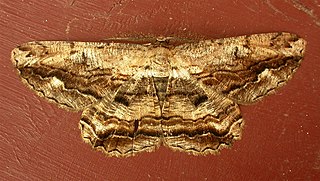
Scioglyptis lyciaria, the white-patch bark moth, is a moth of the family Geometridae that occurs in Australia. The species was first described by Achille Guenée in 1857.
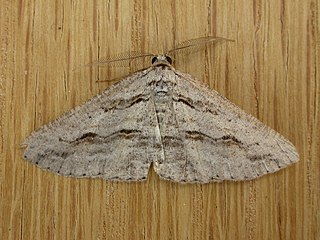
Syneora mundifera, the forest bark moth, is a moth of the family Geometridae first described by Francis Walker in 1860. It is found in Australia.

Pholodes sinistraria, the sinister moth or frilled bark moth, is a moth of the family Geometridae. The species was first described by Achille Guenée in 1857. It is found in the eastern parts of Australia.
Cernia is a monotypic moth genus in the family Geometridae. Its only species, Cernia amyclaria, is found in Australia. Both the genus and species were described by Francis Walker in 1860.

Circopetes is a monotypic moth genus in the family Geometridae erected by Louis Beethoven Prout in 1910. Its only species, Circopetes obtusata, the grey twisted moth, was first described by Francis Walker in 1860. It is found in mainland Australia.

Didymoctenia is a monotypic moth genus in the family Geometridae and subfamily Ennominae which was described by Warren in 1901. Its only species, Didymoctenia exsuperata, the thick-lined bark moth, was first described by Francis Walker in 1860. It is found in Australia.
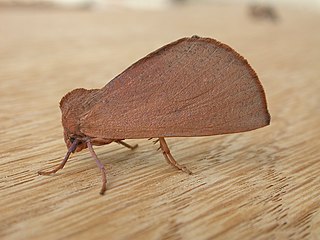
Fisera is a genus of moths in the family Geometridae, the geometer moths. The genus is native to Australia. The genus was erected by Francis Walker in 1860.
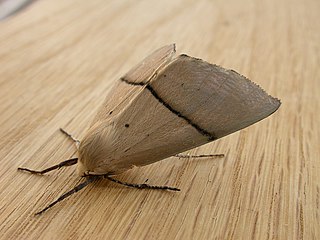
Gastrophora is a monotypic moth genus in the family Geometridae. Its only species, Gastrophora henricaria, the fallen bark looper or beautiful leaf moth, is found in the south-east corner of Australia. Both the genus and species were first described by Achille Guenée in 1857.
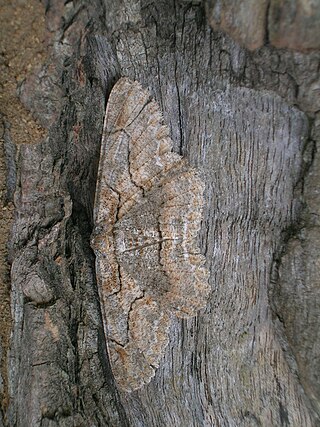
Hypomecis is a genus of moths in the family Geometridae first described by Jacob Hübner in 1821.
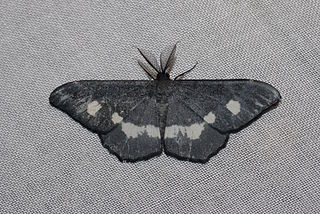
Hyposidra is a genus of moths in the family Geometridae first described by Achille Guenée in 1857.

Nearcha is a genus of moths in the family Geometridae described by Edward Guest in 1887. All species in the genus are known from Australia.
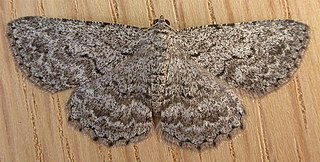
Psilosticha is a genus of moths in the family Geometridae first described by Edward Meyrick in 1892.

Sauris is a genus of moths in the family Geometridae erected by Achille Guenée in 1857.

Taxeotis is a genus of moths in the family Geometridae described by Edward Guest in 1887. All the species in this genus are found in Australia.

Chlorocoma dichloraria, the double-fringed emerald or Guenée's emerald, is a species of moth of the family Geometridae first described by Achille Guenée in 1858. It is found in the Australian states of New South Wales, Queensland, South Australia, Tasmania, Victoria and Western Australia.

Nisista serrata, the serrated crest-moth, is a species of moth of the family Geometridae first described by Francis Walker in 1857. It is found in Australia, including Tasmania, Victoria and South Australia.
Hypodoxa erebusata is a moth of the family Geometridae first described by Francis Walker in 1860. It is found in Australia, including Queensland.

Hyposidra talaca, the black looper or black inch worm, is a moth of the family Geometridae. The species was first described by Francis Walker in 1860. It is found from India to Indochina, Sundaland, Sulawesi, the Philippines, Sri Lanka, the Solomon Islands, Thailand, Taiwan, New Guinea and Australia, where it has been recorded from Queensland. It is a major defoliating pest in tea plantations.

















